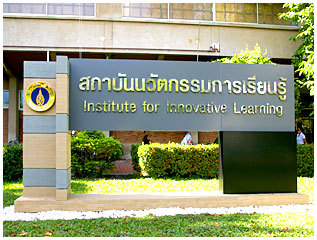
The Institute for Innovative Learning was set up in 2002 in response to problems of learning/teaching at all levels in the educational system. In traditional Thai education, the learner waits to be fed information and the teacher propounds this knowledge nearly in a disciple-master relationship of old. Very little is demanded of the learner in terms of self actualization and dedication. Thus learning/teaching is never geared toward reflection, profundity or even the context of the subject taught. Most teachers with a degree in education with at least a subject major, although exposed to theoretical aspects of good pedagogy in their student years, usually cannot conduct classes to produce the preceding desirable outcomes because they themselves were never taught in the way that they should, i.e., exposure to student-centered pedagogy in an interactive way. The latter demands mastery of contents and pedagogy, a rare combination.
For a long time the Government has recognized this problem and tried to make incremental changes at the school level up to the tertiary level, with limited success. We at Mahidol recognize these limitations of teachers as being due to lack of hands-on and minds-on experiences during their training. Research, in the sense of innovative work lending to rigorous scholarship, is never a part of their requirements. After spending their years with us, we are confident that most of them will have had mastery of both content and pedagogical techniques.

In light of the implementation of the New National Education Act of 1999, the Institute wishes to correct some of the shortcomings of education practices in Thailand by:
Setting up international postgraduate science and technology program (to train future teachers) which emphasizes innovation and communicative skills —so that products from thesis work will be used for further learning/teaching in the classroom, laboratory and field study especially in Thailand.
Demonstrating to Mahidol University faculty and elsewhere the merits of student-centered active learning with the help of modern tools and the wide availability of Internet-based information. Assessments of students’ progress are done to help them instead of passing or failing them.
Creating and adapting multimedia teaching/learning tools for university and school use.
Providing in-service training to Mahidol University faculty and supporting staff elsewhere regarding new and effective implementation of learning theories, with the aim of producing well-rounded graduates who will be able to acquire knowledge and disseminate it effectively for life
Disseminating on our website new educational research findings from Mahidol University and elsewhere.
The Institute launched two postgraduate degree programs for international students in 2003: an M.Sc and Ph.D in Science and Technology Education, in collaboration with the Faculty of Science. It also offers short training programs and operates online information clearinghouse, the Learning Process Club.
It has been 6 years since the establishment of the Institute, we are now producing quality research works that serve local and national interests as well as attain international standards. We expect to be one of the leaders in education in the South-East Asia by 2010.

